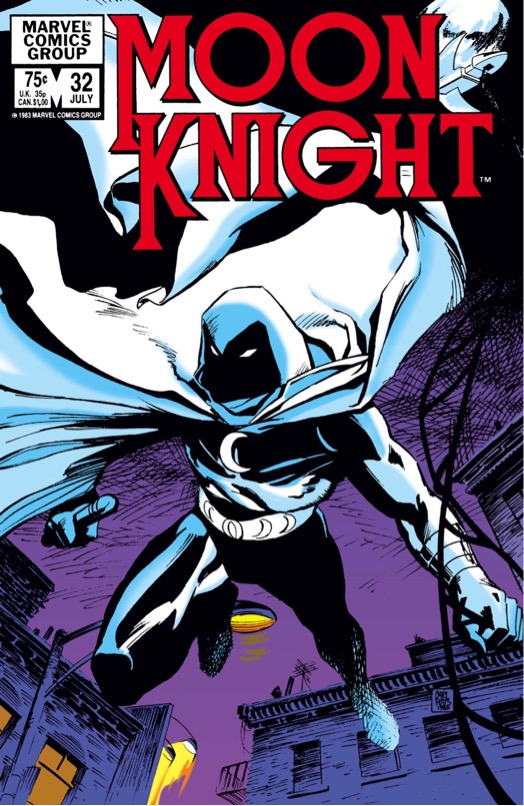Doug Moench, Moon Knight and the Story Behind the Development of “The Man of Many Phases”
“Schizo-darling”
may seem like a poor choice of a pet name for a significant other, but it works
well for American archaeologist Marlene Alraune. Jokes about her lover’s
fragile mental status are just one of the many coping mechanisms she employs to
deal with a life spent helping to save New York City from werewolves, dream
demons, and mind-controlling super weapons. This is because the man she calls
“schizo-darling” in the back of Hulk! Magazine #12 is Marc Spector, AKA Moon
Knight, a Marvel superhero co-created by Doug Moench and Don Perlin in 1975.

Comments about schizophrenia are common in stories about Moon Knight, a character who both maintains multiple alter egos and believes he may have been resurrected by an Egyptian moon deity. This psychological-religious hook means that the character is often referred to as a “crazy” or “insane” and regularly finds himself in mind-melting identity crisis adventures. And, while Moon Knight comics offer readers “delicious psychodrama” 23 the real-life story of the character’s development involves perhaps equally dramatic forces at work.
Central to the
story of both Moon Knight (the character) and Moon Knight (the 1980s
series) is writer and character co-creator Doug Moench. Moench wrote dozens of comics involving Moon Knight from
1975-1999, both in the titular series and a collection of other Marvel titles.
Many of the psycho-mystical themes are a direct result of his work: Like Marc
Spector, Moench has a deep interest in the psychological and believes he may
have experienced paranormal phenomena throughout his life. As Moon Knight
becomes more popular and goes from the comics page to Disney+ shows and video
games like Marvel Ultimate Alliance 3, it’s helpful to explore what went
into the character’s creation. Moench’s own life greatly informed the
development of this character, and understanding his experiences helps show how
Moon Knight came to be the character he is today.
subscribers only.
Learn more about what you get with a subscription
From page 257 of Sean Howe’s Marvel Comics: The Untold Story,↩
From page 257 of Sean Howe’s Marvel Comics: The Untold Story,↩
For more, see David Hadju’s The Ten-Cent Plague and Howe’s Marvel Comics.↩
Unless otherwise cited, all Moench quotes come from a personal interview.↩
From Comics Shenanigans podcast episode 466.↩
Though due to the limited colors in printing, “silver” was really just left white.↩
While some stories reference Moon Knight having lunar-based super strength from his werewolf encounter, this thread is inconsistent and seemed to be dropped.↩
From Comic Geek Speak podcast episode 57.↩
From Comics Shenanigans.↩
In further identity-related antics, Marvel later hired a writer named Steven Grant to work on the Moon Knight series. In Moon Knight #15 Moench playfully called him “a johnny-come-lately imposter.”↩
Regarding other “inspiration,” Moench believes that creativity doesn’t require substance use and that LSD is just a “pain in the ass.” That being said, he shared that “nothing beats weed.”↩
Whose own mental stability should be called into question when he describes his chosen name to no one in particular: “Conquer-Lord…It has a nice…sound.”↩
From that previously noted Comics Shenanigans episode.↩
From that episode of Comic Geek Speak.↩
In which the artist has significant control over the plot and pacing.↩
From his interview for Authors of the Impossible.↩
Who began his prodigious career on the title.↩
Because of this, Moon Knight was also one of the first Marvel series to ship using the burgeoning direct market sales model.↩
In Moon Knight #38, editor Denny O’Neil says he came up with the Khonshu origin story and that Moench only scripted it; Moench says O’Neil “had no [narrative] input at all” and “was happy to just leave me alone.” Regardless of the exact level of editorial input, it seems safe to say Moench had a significant hand in the story.↩
From the aforementioned episode of Comic Shenanigans.↩
Nor am I.↩
Apparently Khonshu didn’t foresee a Disney+ show.↩
From page 257 of Sean Howe’s Marvel Comics: The Untold Story,↩
